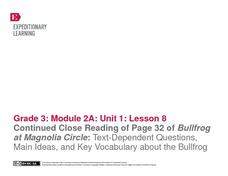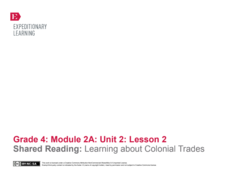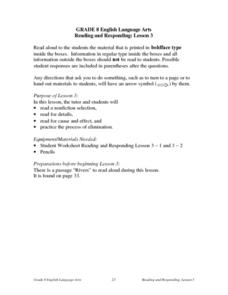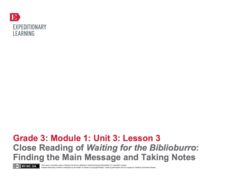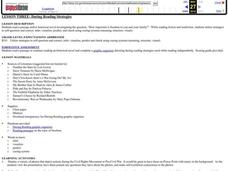EngageNY
Close Reading of Bullfrog at Magnolia Circle: Main Ideas about the Bullfrog
As your class reaches the end of the book Bullfrog at Magnolia Circle, the seventh instructional activity in this literary unit helps third graders transition from reading narrative to expository writing. Scholars develop their...
EngageNY
Mid-Unit Assessment: Close Reading of Bullfrog at Magnolia Circle: Bullfrog Life Cycle
The sixth lesson plan in this Bullfrog at Magnolia Circle unit assesses your third graders' ability to read and understand informational text. The included assessment asks learners to take notes about the main idea and supporting details...
EngageNY
Close Reading of Bullfrog at Magnolia Circle: Text-Dependent Questions, Main Ideas, and Key Vocabulary about the Bullfrog
As your 3rd grade class finishes reading Bullfrog at Magnolia Circle, the eighth lesson plan of this unit helps readers from an understanding of the very specific information on the final page of the book. As with the entire unit,...
Curated OER
Elementary Reading: Five Passages with Questions
Five brief readings with questions support practice with various literacy skills. In some cases, learners identify whether underlined words are spelled correctly. Other times, they answer reading comprehension questions about the text or...
National Council of Teachers of English
Timelines and Texts: Motivating Students to Read Nonfiction
With the emphasis on incorporating more nonfiction in language arts classes the question arises about how to design activities that motivate kids to engage with informational text. How about an assignment that asks class members to...
Curated OER
Mixed Bags: Fiction and Nonfiction
The second in a series of three lessons from Scholastic comparing and contrasting fiction and nonfiction, this activity requires learners to read, write, and compare two books independently. After briefly reviewing the features of...
Curated OER
Characteristics of Nonfiction
The second lesson in a series from ReadWorks.org, this lesson continues to explore the difference between fiction and nonfiction texts. The lesson opens with the teacher reviewing a class Venn diagram started in the last lesson....
EngageNY
Asking and Answering Questions: Reading about a Frog's Habitat
Building upon previous lessons, scholars take to asking and answering questions about a frog's habitat. A partner discussion follows a read-aloud of an informational text in preparation for a worksheet that boosts reading comprehension...
EngageNY
Shared Reading: Learning About Colonial Trades
Trading in Colonial America is the focus of a lesson plan that boosts reading skills. As a class, scholars examine the informational text for crucial details, use their newfound knowledge to share information with their peers, and write...
Curated OER
Watch the Road Signs
What makes a good speaker? Upper elementary learners practice oral fluency by working with a partner to read nonfiction books. While reading, they practice using correct tone of voice, making eye contact, and speaking clearly.
Museum of Disability
Buddy, The First Seeing Eye Dog
Learn about how the seeing eye dog program began with a reading lesson about Eva Moore's chapter book, Buddy, The First Seeing Eye Dog. With vocabulary words, discussion questions, and extension resources, the lesson is a great way for...
EngageNY
Grade 9 ELA Module 1, Unit 1, Lesson 5
Finding the central idea in a text is equally important in fiction and nonfiction. Work on analyzing a piece of writing for the central idea with Karen Russell's "St. Lucy's Home for Girls Raised by Wolves," complete with supporting...
EngageNY
Grade 10 ELA Module 4: Unit 3, Lesson 3
What's the difference between men and princes? Machiavelli discusses this distinction in chapter 18 of The Prince. Scholars first listen to a masterful reading of the chapter. Then, they write about how the author develops a central idea...
Core Knowledge Foundation
The Five Senses Tell It Again!™ Read-Aloud Anthology
Young readers explore the five senses with a read-aloud anthology. Each lesson follows the routine of introducing the reading, listening to a read-aloud, answering comprehension questions, then practicing a skill. Modification and...
Curated OER
Reading and Responding: Lesson 3
Reinforce comprehension of informational text. This is a one-on-one instructional activity intended to build an internal dialogue the reader can use to boost overall comprehension. They work independently with a tutor or teacher to read...
EngageNY
Close Reading of Waiting for the Biblioburro: Finding the Main Message and Taking Notes
Expose your class to Waiting for the Biblioburro, narrative nonfiction that will act as the bridge between ficiton and informational texts to come. Class members do a close reading of the text, looking at excerpts instead of the whole...
Curated OER
During Reading Strategies
"How important is freedom to you and your family?" The guiding question becomes much more powerful after your class reads and responds to a passage from a historical novel. While reading the passage, they complete a graphic organizer...
Curated OER
Reading For Information
To help learners better comprehend informational texts, they work through a series of activities. They discuss strategies, make predictions, skim passages, focus on key words, and practice taking notes. This lesson focuses on what to do...
Media Smarts
Bias in News Sources
As young consumers of media, it is important for high schoolers to explore concepts of bias and prejudice, and how they may be present in media. After discussing ideological messages that media can contain, individuals complete a warm-up...
Prestwick House
Writing Arguments in Response to Nonfiction
Emotional appeal or argument? That is the question. An informative lesson helps your class recognize the difference between a logical argument and an emotional appeal and learn how to craft an argumentative response. Writers develop a...
ReadWriteThink
Captioning the Civil Rights Movement: Reading the Images, Writing the Words
Scholars boost their knowledge of the Civil Rights Movement with a lesson plan that challenges writers, readers, and historians to analyze primary sources and caption their observations. By way of reading, writing, discussion,...
Really Good Stuff
Nonfiction Text Features Poster Set
Identifying nonfiction text features is a skill students can take to any subject. A packet of posters demonstrate different text features that learners would encounter in a textbook or informational article, encouraging pupils to think...
PBS
Reading Adventure Pack: Bees
A Reading Adventure pack explores the busy life of bees. After reading a fiction and nonfiction text, scholars complete three hands-on activities. Participants invent a robot that can do the work of bees, cheers to hardworking bees with...
PBS
Reading Adventure Pack: Oceans
Flotsam by David Wiesner and The Magic School Bus on the Ocean Floor by Joanna Cole, illustrated by Bruce Degen, begin a reading adventure pack focusing on oceans. With story listening and thoughtful discussion, scholars complete several...




